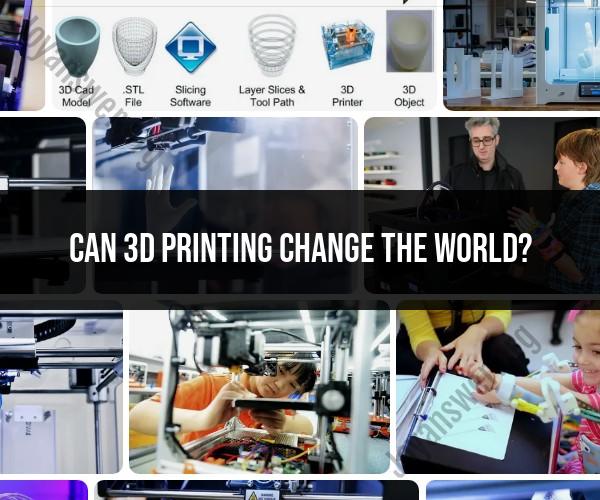Can 3D printing change the world?
Yes, 3D printing has the potential to significantly change the world across various fields and industries due to its transformative technological impact. Here are several ways in which 3D printing is making a difference:
Customization and Personalization: 3D printing allows for the rapid and cost-effective production of customized products. This has implications in healthcare, where personalized medical devices, prosthetics, and even medications can be tailored to individual patients.
Reducing Material Waste: Traditional manufacturing often generates a significant amount of waste material. 3D printing is an additive manufacturing process, meaning it adds material layer by layer, minimizing waste. This can lead to more sustainable and eco-friendly manufacturing.
Complex Geometries: 3D printing enables the creation of intricate and complex geometries that would be challenging or impossible to achieve using traditional manufacturing methods. This is particularly valuable in aerospace, automotive, and architecture for lightweight and structurally efficient designs.
Prototyping and Rapid Iteration: 3D printing is widely used for rapid prototyping. It allows designers and engineers to quickly iterate and test designs, reducing development time and costs.
Medical Advancements: 3D printing is revolutionizing the medical field. It is used to create patient-specific implants, surgical models, and even organs and tissues for transplantation. It has the potential to address shortages in organ transplantation and improve healthcare outcomes.
Aerospace and Defense: The aerospace and defense industries use 3D printing to manufacture lightweight, complex parts for aircraft and spacecraft. This technology reduces the weight of components, leading to fuel savings and improved performance.
Education and Innovation: 3D printing is being integrated into education, enabling students to learn about design, engineering, and manufacturing. It fosters innovation and creativity by making it easier for individuals to turn their ideas into physical prototypes.
Localized Production: With 3D printing, products can be manufactured locally, reducing the need for long-distance shipping and logistics. This has implications for supply chain resilience and sustainability.
Construction: In construction, 3D printing is being used to build houses and infrastructure more efficiently and affordably. It has the potential to address housing shortages and provide disaster relief.
Art and Design: Artists and designers are using 3D printing to create unique sculptures, jewelry, and fashion items that were previously difficult to produce.
While 3D printing has tremendous potential, it also faces challenges related to materials, quality control, intellectual property, and regulatory considerations. As the technology continues to advance and mature, it is likely to have an increasingly significant impact on various aspects of our lives, transforming industries, and enabling new innovations.
3D Printing's Potential to Change the World: A Comprehensive Analysis
3D printing, also known as additive manufacturing, is a revolutionary technology that has the potential to change the world in many ways. It is a process of creating three-dimensional objects from a digital model. 3D printers can be used to create a wide variety of objects, from simple prototypes to complex finished products.
3D printing has a number of advantages over traditional manufacturing methods. It is faster, more flexible, and more cost-effective for small-scale production. 3D printing can also be used to create objects that would be impossible or impractical to produce using traditional manufacturing methods.
One of the most significant potential impacts of 3D printing is on the global supply chain. 3D printing allows products to be manufactured locally, which can reduce transportation costs and environmental impact. 3D printing can also help to reduce inventory levels and improve responsiveness to customer demand.
The Revolutionary Impact of 3D Printing on Various Industries
3D printing is already having a major impact on a number of industries, including:
- Manufacturing: 3D printing is being used to produce prototypes, tools, and finished products in a wide range of industries, including aerospace, automotive, medical, and consumer goods.
- Healthcare: 3D printing is being used to create custom prosthetics, implants, and surgical instruments. 3D printing is also being used to develop new drug delivery systems and tissue engineering applications.
- Construction: 3D printing is being used to create custom building components, such as walls, roofs, and furniture. 3D printing is also being used to build entire houses.
- Education: 3D printing is being used to create educational models and prototypes. 3D printing is also being used to teach students about engineering and design.
Disruptive Technology: How 3D Printing Can Transform Our Future
3D printing is a disruptive technology that has the potential to transform the way we live and work. It can help us to create new products and services, improve existing products and services, and reduce the cost of production.
3D printing can also help us to address some of the world's most pressing challenges, such as climate change and poverty. For example, 3D printing can be used to develop new renewable energy technologies and to create affordable housing for people in developing countries.
Conclusion
3D printing is a revolutionary technology with the potential to change the world in many ways. It is still in its early stages of development, but it is already having a major impact on a number of industries. As 3D printing technology continues to develop, it is likely to have an even greater impact on our lives and work.













